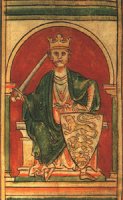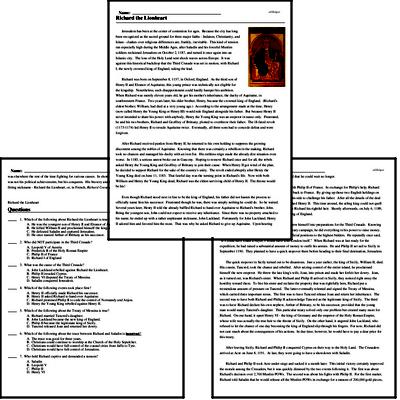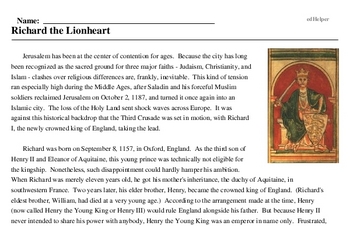Richard the Lionheart
Richard I
Reading Comprehension for September 8
Jerusalem has been at the center of contention for ages. Because the city has long been recognized as the sacred ground for three major faiths - Judaism, Christianity, and Islam - clashes over religious differences are, frankly, inevitable. This kind of tension ran especially high during the Middle Ages, after Saladin and his forceful Muslim soldiers reclaimed Jerusalem on October 2, 1187, and turned it once again into an Islamic city. The loss of the Holy Land sent shock waves across Europe. It was against this historical backdrop that the Third Crusade was set in motion, with Richard I, the newly crowned king of England, taking the lead.
Richard was born on September 8, 1157, in Oxford, England. As the third son of Henry II and Eleanor of Aquitaine, this young prince was technically not eligible for the kingship. Nonetheless, such disappointment could hardly hamper his ambition. When Richard was merely eleven years old, he got his mother's inheritance, the duchy of Aquitaine, in southwestern France. Two years later, his elder brother, Henry, became the crowned king of England. (Richard's eldest brother, William, had died at a very young age.) According to the arrangement made at the time, Henry (now called Henry the Young King or Henry III) would rule England alongside his father. But because Henry II never intended to share his power with anybody, Henry the Young King was an emperor in name only. Frustrated, he and his two brothers, Richard and Geoffrey of Brittany, plotted to overthrow their father. The ill-fated revolt (1173-1174) led Henry II to invade Aquitaine twice. Eventually, all three sons had to concede defeat and were forgiven.
After Richard received pardon from Henry II, he returned to his own holding to suppress the growing discontent among the nobles of Aquitaine. Knowing that there was certainly a rebellion in the making, Richard took no chances and managed his duchy with an iron fist. His ruthless reign made the already dire situation even worse. In 1183, a serious unrest broke out in Gascony. Hoping to remove Richard once and for all, the rebels asked Henry the Young King and Geoffrey of Brittany to join their cause. When Henry II got wind of the plan, he decided to support Richard for the sake of the country's unity. The revolt ended abruptly after Henry the Young King died on June 11, 1183. That fateful day was the turning point in Richard's life. Now with both William and Henry the Young King dead, Richard was the eldest surviving child of Henry II. The throne would be his!
Even though Richard stood next in line to be the king of England, his father did not hasten the process to officially name him his successor. Frustrated though he was, there was simply nothing he could do. So he waited. Several years later, Henry II told the already baffled Richard to hand over Aquitaine to Richard's brother, John. Being the youngest son, John could not expect to receive any inheritance. Since there was no property attached to his name, he ended up with a rather unpleasant nickname, John Lackland. Fortunately for John Lackland, Henry II adored him and favored him the most. That was why he asked Richard to give up Aquitaine. Upon hearing that demand, Richard refused it flat-out and decided that he could wait no longer.




